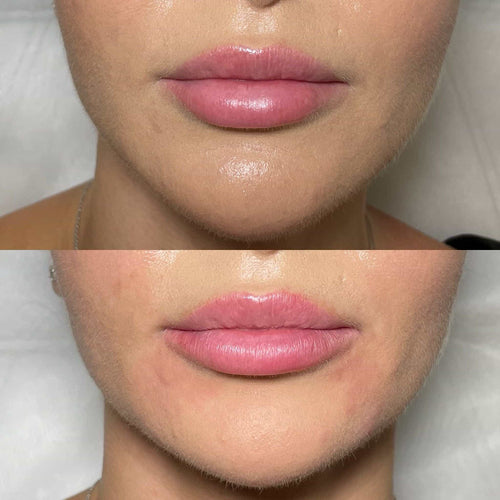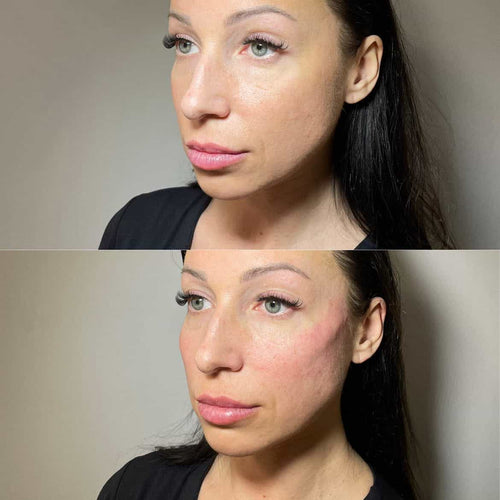Book Your Dermal Filler Appointment with Dr. Laura Geige Today
Pre-Injection Preparation
To ensure optimal results and minimize potential complications when using lip fillers like hyaluronic acid or collagen, it’s essential to follow a pre-injection preparation protocol.
Pre-injection preparation typically begins 24-48 hours prior to the filler injection date, allowing the skin to return to its normal state after any previous injections, treatments, or surgeries.
A good pre-injection diet involves consuming foods that promote collagen production and improve skin elasticity. These include fatty fish like salmon rich in omega-3 fatty acids, leafy greens such as spinach packed with vitamin C, and berries high in antioxidants.
Hydration is also crucial, so drink plenty of water throughout the day to keep your skin plump and hydrated from within. Aim for at least 8 cups (64 ounces) of water daily, more if you’re planning a particularly busy day or have been engaging in strenuous physical activity.
Avoid foods that can cause inflammation, such as spicy dishes, high-fat meals, or foods containing MSG, artificial sweeteners, and excessive caffeine. These can interfere with platelet function, leading to bruising and swelling at the injection site.
Topical treatments like vitamin C serums or retinol creams may be applied 24-48 hours before the filler injection to enhance collagen production, reduce fine lines, and improve skin texture.
It’s also recommended to avoid sun exposure for a day or two prior to the filler injection date, as excessive UV radiation can damage the skin and compromise the results of the treatment. Use sunscreen with an SPF of at least 30 and wear protective clothing when outdoors during peak sun hours.
Avoid any medications that may interfere with bleeding disorders or impact platelet function, such as aspirin, ibuprofen (although this is not recommended immediately before injection), or blood-thinning medications like warfarin. Consult your practitioner about any medications you’re taking and their potential interaction with lip filler treatments.
On the day of the appointment, arrive at least 15-30 minutes early to complete any necessary paperwork and get settled in before the procedure begins. Make sure to bring all required documents, including a valid government ID and proof of insurance if applicable.
The practitioner will typically cleanse your face using an antiseptic solution to minimize bacteria and other microorganisms at the injection site. This helps prevent infection and ensures safe treatment outcomes.
To ensure optimal results and minimize potential complications, it’s essential to follow a strict pre-injection preparation regimen when considering dissolvable lip filler injections.
Avoid taking ibuprofen for at least 7-10 days before the procedure, as this medication can increase the risk of bruising, swelling, and bleeding in the treated area.
Ibuprofen is a nonsteroidal anti-inflammatory drug (NSAID) that can interfere with blood clotting, which may lead to unwanted bleeding or bruising at the injection site.
Additionally, ibuprofen may also increase inflammation and swelling in the treated area, making it more challenging for the filler material to settle smoothly into place.
It’s crucial to note that the exact timing of when to avoid ibuprofen can vary depending on individual factors, such as the specific lip filler being used and any pre-existing medical conditions.
Typically, a 7-10 day window is recommended to allow for optimal recovery and minimize potential complications.
In the case of dissolvable fillers like hyaluronic acid or calcium hydroxylapatite, it’s best to avoid ibuprofen at least 7 days before the procedure to ensure the filler material can be absorbed safely and effectively.
Avoiding ibuprofen for this extended period allows the body to heal and recover properly after the injection, reducing the risk of complications like lumps, bumps, or unevenness in the treated area.
It’s also essential to note that some prescription medications, such as blood thinners and certain antidepressants, should be stopped at least 7 days before the procedure, as they can increase the risk of bleeding and bruising.

To ensure a smooth and successful outcome, it’s best to consult with a qualified healthcare professional or dermatologist for personalized pre-injection preparation guidance.
They will assess your individual needs and provide tailored advice on medications to avoid, supplements to take, and any other necessary preparations to optimize the results of your dissolvable lip filler injections.
Surgical Lip Filler Injections
Ibuprofen is a commonly used over-the-counter medication for pain and inflammation, which is why it’s often asked if it can be taken after lip filler injections.
Lip fillers, such as hyaluronic acid, calcium hydroxylapatite, or poly-L-lactic acid, are injected into the lips to enhance their shape, size, or appearance.

Temporary fillers, like hyaluronic acid, typically last between 6-18 months before they are fully absorbed by the body.
Permanent fillers, such as poly-L-lactic acid, can take up to 2 years or more to be fully dissolved and removed from the body.
To ensure proper healing and minimize the risk of complications, patients often ask when it’s safe to start taking ibuprofen after lip filler injections.
The American Society for Dermatologic Surgery (ASDS) recommends avoiding NSAIDs like ibuprofen for 24-48 hours after lip filler injections to prevent bleeding and bruising.
This is because ibuprofen can thin the blood, which may increase the risk of bleeding at the injection site or around the lips.
Temporary fillers typically require a longer recovery period, usually up to 2 weeks, during which time patients should avoid strenuous activities and follow their doctor’s specific instructions.
During this time, ibuprofen is usually recommended only if necessary, as it may slow down the healing process or worsen any potential bleeding or bruising.
Permanent fillers, on the other hand, have a shorter recovery period, typically 1-2 weeks, and can be more invasive, requiring multiple sessions to achieve the desired results.
However, ibuprofen is not usually recommended after permanent filler injections, as the risks of bleeding and bruising are higher due to the longer-acting effects of the medication.
In general, patients should follow their doctor’s specific instructions regarding pain management and medication after lip filler injections, as the best course of action may vary depending on individual circumstances.
It’s also essential to note that some patients may be more susceptible to complications or interactions with medications due to pre-existing medical conditions, taking other medications, or having a history of bleeding disorders.
In these cases, it’s crucial to consult with a qualified healthcare professional or a board-certified dermatologist for personalized advice on medication and recovery.
Ultimately, the decision to take ibuprofen after lip filler injections should be made in consultation with a qualified healthcare professional who can assess individual factors and provide guidance on safe pain management and post-injection care.
Surgical lip filler injections are a popular cosmetic treatment used to enhance the shape and appearance of the lips. These injections involve the insertion of hyaluronic acid, calcium hydroxylapatite, or poly-L-lactic acid into the lips to restore lost volume, smooth fine lines, and contours.
The type of lip filler used can vary depending on individual needs and preferences. Temporary fillers, such as hyaluronic acid, are usually composed of non-permanent materials that dissolve naturally over time. Permanent fillers, like calcium hydroxylapatite or poly-L-lactic acid, contain long-lasting materials that remain in the body for a longer period.
The recovery process after lip filler injections typically involves some temporary side effects, such as bruising, swelling, and mild discomfort. However, there are specific precautions patients must take to ensure proper healing and minimize risks.
According to the American Society of Plastic Surgeons (ASPS), it is recommended that patients avoid taking ibuprofen for at least 24 hours after temporary lip filler injections. Ibuprofen can interfere with the absorption of hyaluronic acid, potentially leading to reduced effectiveness or complications during the healing process.
Similarly, patients are advised to refrain from taking ibuprofen for 7-14 days after permanent lip filler injections. This extended period is necessary due to the longer duration of poly-L-lactic acid, which may remain in the body for up to two years or more.
- Temporary fillers: Avoid ibuprofen for at least 24 hours after treatment
- Permanent fillers: Refrain from taking ibuprofen for 7-14 days after treatment
It is essential to follow your healthcare provider’s or dentist’s specific instructions regarding medication and recovery guidelines. In some cases, alternative pain management options may be recommended.
A well-informed understanding of the risks and benefits associated with lip filler injections can help patients make informed decisions about their cosmetic treatment options.
Post-Injection Care
Ibuprofen can be a helpful medication to take after certain types of injections, but it’s essential to understand when it’s safe to do so and how it may interact with your lip filler.
After receiving a lip injection, you may experience some inflammation, swelling, and pain in the treated area. While ibuprofen can help alleviate these symptoms, it’s crucial to follow your doctor’s specific guidance on when to take the medication.
Ibuprofen and its effects: Ibuprofen is a nonsteroidal anti-inflammatory drug (NSAID) that works by reducing inflammation, pain, and fever. It’s often used to treat minor aches and pains, such as headaches, muscle strains, and joint pain.
When taken after lip filler injection, ibuprofen can help minimize swelling, redness, and discomfort in the treated area. However, it’s essential to remember that ibuprofen does not dissolve fat, so if you’re concerned about bruising or swelling, your doctor may recommend alternative treatments.
Timeline for taking Ibuprofen after lip filler: The timing of when you can take ibuprofen after lip filler injection varies depending on individual factors, such as the type and location of the injection. Generally, doctors recommend waiting at least a few days before starting ibuprofen, but this may vary.
Typically, doctors will prescribe ibuprofen 2-3 days after the injection to help manage any discomfort or swelling. However, it’s essential to follow your doctor’s specific instructions and not exceed the recommended dosage.
Get Your Dermal Filler Consultation with Dr. Laura Geige
Risks and Precautions: While ibuprofen is generally safe for most people, there are certain risks and precautions to be aware of when taking the medication after lip filler injection:
*Stomach problems: Ibuprofen can increase your risk of stomach pain, ulcers, and bleeding. If you experience any stomach issues or difficulty swallowing, stop taking ibuprofen and consult your doctor.
*Allergic reactions: Rarely, people may be allergic to ibuprofen. If you experience hives, itching, swelling, or difficulty breathing after taking ibuprofen, seek medical attention immediately.
*Kidney or liver problems: Ibuprofen can worsen kidney or liver problems in some individuals. If you have a pre-existing condition or concern, consult your doctor before starting ibuprofen.
Alternatives to Ibuprofen: Depending on the individual needs and concerns of each person, alternative treatments may be recommended after lip filler injection:
*Creams and gels: Topical creams or gels containing ingredients like caffeine, arnica, or peptides can help reduce swelling, redness, and discomfort.
*Cooling pads or compresses: Applying a cooling pad or cold compress to the treated area can help alleviate pain and inflammation.
Get Your Dermal Filler Consultation with Dr. Laura Geige Today
*Rest and ice: Getting plenty of rest and applying ice to the treated area can help reduce swelling and promote healing.
Conclusion
When it comes to taking ibuprofen after lip filler injection, it’s essential to consult your doctor for specific guidance on when to start and how much to take. While ibuprofen can be a helpful medication in managing discomfort and swelling, it’s crucial to weigh the benefits against any potential risks and consider alternative treatments to achieve optimal results.
The American Academy of Dermatology emphasizes the importance of post-injection care after receiving lip fillers to ensure a smooth and safe recovery process. One crucial aspect of this care is managing pain and discomfort, which can be alleviated with the use of ibuprofen.
Ibuprofen, a nonsteroidal anti-inflammatory drug (NSAID), is commonly recommended by healthcare providers for post-injection pain management after lip filler injections. However, it is essential to note that ibuprofen may not be suitable for everyone, and its use should only be guided by your healthcare provider.
Here are some key considerations when taking ibuprofen after lip filler injections:
-
Blood thinning medications, such as warfarin or aspirin, may interact with ibuprofen, increasing the risk of bleeding. If you are taking any blood thinners, consult your healthcare provider before taking ibuprofen.
-
Pregnancy and breastfeeding women should use caution when taking ibuprofen, as it can cause harm to the unborn baby or infant. Your healthcare provider will provide personalized guidance on safe usage during these periods.
-
Patients with stomach ulcers, kidney disease, or heart failure may need to avoid ibuprofen or use it under close medical supervision. Your healthcare provider will assess your individual health situation before recommending ibuprofen.
-
It is crucial to follow the recommended dosage and administration instructions provided by your healthcare provider. Taking more or less than prescribed can lead to adverse effects, such as stomach upset or increased risk of bleeding.
-
Ibuprofen should only be taken as directed by your healthcare provider for a limited period (usually 1-2 weeks) after lip filler injections. Prolonged use may increase the risk of side effects and delay healing.
Additionally, it is essential to monitor yourself for any signs of complications or adverse reactions when taking ibuprofen after lip filler injections, such as:
-
Nausea, vomiting, or stomach pain
-
Abdominal bleeding or bruising
-
Ringing in the ears or dizziness
-
Increased heart rate or blood pressure
Your healthcare provider will closely monitor your progress and adjust treatment as needed to ensure a safe and successful recovery from lip filler injections.
Read more about C4YL here. Read more about Gifted Brits here. Read more about Alkhemist LA here. Read more about Prince and Flower here. Read more about D Magazine Salon here.
- The Evolution Of Graysexuality And Its Influence On Modern Dating Trends - June 1, 2025
- Profhilo Treatment Near Selhurst, Surrey - May 31, 2025
- THC Seltzers And How To Enjoy Them Responsibly - May 30, 2025
